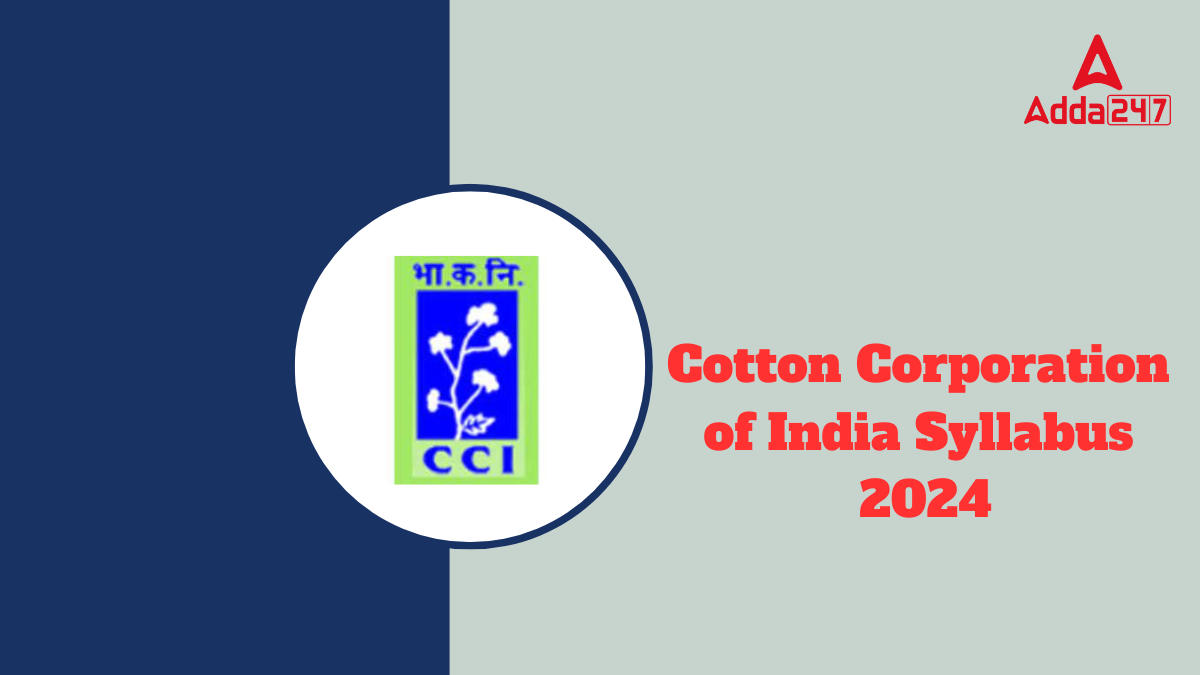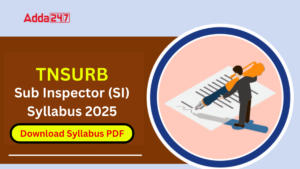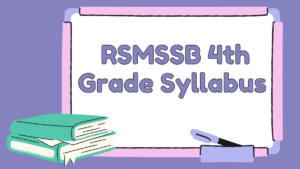Table of Contents
Candidates preparing for the exam of Cotton Corporation of India Recruitment 2024 for the roles of Management Trainee (Marketing & Accounts), Junior Assistant (General), and Junior Commercial Executive can benefit from accessing the most updated Cotton Corporation of India Syllabus 2024. Utilizing the latest syllabus will help candidates effectively enhance their preparation. In this article, we will provide a comprehensive overview of the Cotton Corporation of India Syllabus 2024 to assist you in your exam preparation.
Cotton Corporation of India Exam 2024
On June 11th, 2024, the Cotton Corporation of India (CCI) issued a brief notification announcing the recruitment of 214 positions across various departments. The available roles include Junior Commercial Executive, Assistant Manager, Management Trainee, and Junior Assistant. Candidates interested in applying for these positions can begin the application process on June 12th, 2024, by visiting the official CCI website. For additional details and updates, please refer to the table below.
| Cotton Corporation of India 2024 | |
| Organization | Cotton Corporation of India (CCI) |
| Post Name | Junior Commercial Executive, and Management Trainee (Marketing & Accounts), Junior Assistant (General) |
| Vacancies | 214 |
| Category | Syllabus |
| Selection Process | Written Exam and Interview |
| Job Location | Pan India |
| Official Website | www.cotcorp.org.in |
Cotton Corporation of India Syllabus 2024
To prepare effectively for a career with the Cotton Corporation of India (CCI), it’s essential to first understand the syllabus and key study areas. The syllabus covers a range of subjects including Arithmetic, Logical Reasoning, English, General Knowledge, and specific knowledge related to cotton and agriculture. This comprehensive syllabus acts as a roadmap for your study plan, highlighting the areas you need to focus on.
Familiarizing yourself with the syllabus is a crucial step in your preparation, as it will help you target your studies effectively and improve your chances of success in the recruitment process. Below, you will find the detailed exam schedule and syllabus information for each position available at CCI. Taking the time to thoroughly review and understand these details is vital for achieving your goal of joining the CCI.
CCI Junior Commercial Executive Exam Pattern
The Cotton Corporation of India Junior Commercial Executive Exam Pattern consists of five sections, and candidates have 120 minutes to complete 120 Objective MCQ-style questions. For every correct answer, one mark will be awarded; for every erroneous answer, one-fourth of a mark will be deducted.
| Junior Commercial Executive Exam Pattern | |||
| Section | Nature of Questions | Marks per Item | No. of Items |
| Unit-I: General English | Articles, Prepositions, vocabulary, Reading and Comprehension, synonyms, jumbled sentences, etc. | 01 Mark | 15 |
| Unit-II: Reasoning | Syllogism, coded inequalities, direction and distance, ordering and ranking, blood relation, Data interpretation, coding and decoding, deductive logic, data sufficiency, series compilation, puzzles, pattern completion, etc. | 01 Mark | 15 |
| Unit-III: Quantitative Aptitude | Ratio and proportion, Time and work, speed and distance, percentages and averages, profit, loss and discount, probability, Simple and Compound Interest, etc. | 01 Mark | 15 |
| Unit-IV: General Knowledge | Indian geography, Indian trade & Economy, current affairs- World & India, scientific research, awards, sports, World geography, etc. | 01 Mark | 15 |
| Unit-V: Subject Knowledge | Will check knowledge from the syllabus given below | 01 Mark | 60 |
CCI Junior Commercial Executive Subject Syllabus
The post of Junior Commercial Executive under Cotton Corporation of India is all about agriculture-related posts. In Subject Knowledge, Part V the knowledge related to agriculture will be accessed. Check the detailed topics for the CCI Jr. Commercial Executive exam.
Unit I
This section includes General English which has many sub-topics:
- Articles
- Prepositions
- Vocabulary
- Reading and Comprehension
- Synonyms
- Jumbled sentences
- Sentence Improvement
- Error Detection
- Cloze Test
- Sentence Rearrangement etc.
Unit II
This section includes reasoning which has many sub-topics:
- Syllogism
- Coded inequalities
- Direction and distance
- Ordering and ranking
- Blood relation
- Data interpretation
- Coding and decoding
- Deductive logic
- Data sufficiency
- Series compilation
- Puzzles
- Pattern completion
- Alphabet and Number Series
- Seating Arrangements
- Input-Output
- Critical Reasoning
- Analytical Reasoning etc.
Unit III
This section includes quantitative aptitude which has many sub-topics:
- Ratio and proportion
- Time and work
- Speed and Distance
- Percentages and Averages
- Profit, Loss, and Discount
- Probability
- Simple and Compound Interest
- Data Interpretation (Tables, Charts, Graphs)
- Mensuration
- Number Series
- Quadratic Equations
- Time, Speed, and Distance
- Time and Work Problems, etc.
Unit IV
This section includes general knowledge which has many sub-topics:
- Indian Geography
- Indian Trade & Economy
- Current Affairs- World & India
- Scientific research
- Awards
- Sports
- World Geography
- History of India
- the Indian National Movement
- Indian Constitution
- Indian Polity
- Environmental Issues
- International Organizations
- Books and Authors
- Famous Personalities, etc.
Unit V
This section includes agriculture which has many sub-topics:
- Agricultural marketing, Trade & Practices
- Farm Power and Machinery
- Agricultural Entomology
- Crop Pest and their Management
- Agricultural Microbiology
- Soil Microbiology
- Principles of Agricultural Agronomy
- Field crops
- Weed Management
- Organic Farming
- Dimension of Agricultural Farming
- Cotton procurement, cotton area, production, yield, and cotton scenario both domestic and international cotton.
CCI Junior Assistant (General) Exam Pattern 2024
There are five sections in the Cotton Corporation of India Junior Assistant (General) Exam Pattern, with a total of 120 Objective MCQ-style questions to answer in 120 minutes. One mark will be given for each right response, while each incorrect response will result in a 0.25 (1/4) mark deduction.
| Junior Assistant (General) Exam Pattern | |||
| Section | Nature of Questions | Marks per Item | No. of Items |
| Unit-I: General English | Articles, Prepositions, vocabulary, Reading and Comprehension, synonyms, jumbled sentences, etc. | 01 Mark | 15 |
| Unit-II: Reasoning | Syllogism, coded inequalities, direction and distance, ordering and ranking, blood relation, Data interpretation, coding and decoding, deductive logic, data sufficiency, series compilation, puzzles, pattern completion, etc. | 01 Mark | 15 |
| Unit-III: Quantitative Aptitude | Ratio and proportion, Time and work, speed and distance, percentages and averages, profit, loss and discount, probability, Simple and Compound Interest, etc. | 01 Mark | 15 |
| Unit-IV: General Knowledge | Indian geography, Indian trade & Economy, current affairs- World & India, scientific research, awards, sports, World geography, etc. | 01 Mark | 15 |
| Unit-V: Subject Knowledge | Will check knowledge from the syllabus given below | 01 Mark | 60 |
CCI Junior Assistant (General) Syllabus
The detailed syllabus of Junior Assistant (General) is given below. Also in this exam, General Administration will be asked. Candidates should prepare accordingly.
Unit I: General English
- Articles: Words used to specify nouns.
- Prepositions: Words indicating relationships between other words.
- Vocabulary: Knowledge and understanding of words.
- Reading and Comprehension: Understanding passages and answering questions.
- Synonyms: Words with similar meanings.
- Jumbled sentences: Rearranging words to form coherent sentences.
- Sentence Improvement: Making sentences clearer or more concise.
- Error Detection: Identifying mistakes in sentences.
- Cloze Test: Fill in missing words in a passage.
- Sentence Rearrangement: Reordering sentences to create logical paragraphs.
Unit II: Reasoning
- Syllogism: Logical reasoning using two premises and a conclusion.
- Coded Inequalities: Solving inequalities using codes for numbers or variables.
- Direction and Distance: Understanding spatial relationships and directions.
- Ordering and Ranking: Sequencing items or individuals based on given criteria.
- Blood Relation: Understanding familial relationships.
- Data Interpretation: Analyzing and interpreting data from tables, charts, and graphs.
- Coding and Decoding: Transforming messages using a code.
- Deductive Logic: Drawing conclusions based on given premises.
- Data Sufficiency: Determining if given data is sufficient to solve a problem.
- Puzzles: Solving logical or mathematical puzzles.
- Pattern Completion: Identifying missing parts in a given pattern.
- Alphabet and Number Series: Recognizing patterns in sequences of letters or numbers.
- Seating Arrangements: Arranging individuals or objects based on given conditions.
- Input-Output: Analyzing input and output patterns.
- Critical Reasoning: Evaluating arguments or statements.
- Analytical Reasoning: Analyzing relationships and drawing conclusions logically.
Unit III: Quantitative Aptitude
- Ratio and Proportion: Comparing quantities.
- Time and Work: Calculating time taken to complete tasks.
- Speed and Distance: Calculating speed, time, and distance.
- Percentages and Averages: Calculating percentages and averages.
- Profit, Loss, and Discount: Calculating profit or loss percentages and discounts.
- Probability: Analyzing the likelihood of events occurring.
- Simple and Compound Interest: Calculating interest amounts.
- Data Interpretation: Analyzing and interpreting data from various sources.
- Mensuration: Calculating measurements of geometric shapes.
- Number Series: Identifying patterns in sequences of numbers.
- Quadratic Equations: Solving equations of the form ax^2 + bx + c = 0.
- Time, Speed, and Distance: Calculating time, speed, and distance about each other.
- Time and Work Problems: Solving problems related to work done over time.
Unit IV: General Knowledge
- Indian Geography: Understanding geographical features of India.
- Indian Trade & Economy: Knowledge of India’s trade and economic policies.
- Current Affairs: Awareness of recent events and developments.
- Scientific Research: Knowledge of ongoing scientific studies and discoveries.
- Awards: Recognition given for achievements in various fields.
- Sports: Knowledge of sports events and athletes.
- World Geography: Understanding geographical features of the world.
- History of India: Knowledge of India’s historical events and periods.
- Indian National Movement: Understanding India’s struggle for independence.
- Indian Constitution: Knowledge of India’s governing laws and principles.
- Indian Polity: Understanding India’s political system.
- Environmental Issues: Awareness of environmental challenges and conservation efforts.
- International Organizations: Knowledge of global organizations and their functions.
- Books and Authors: Familiarity with literary works and their writers.
- Famous Personalities: Recognition of notable individuals in various fields.
Unit V: Agriculture
- Agricultural Marketing, Trade & Practices: Knowledge of agricultural business and trade practices.
- Farm Power and Machinery: Understanding machinery used in farming operations.
- Agricultural Entomology: Study of insects affecting agriculture.
- Crop Pest and their Management: Identifying and managing crop pests.
- Agricultural Microbiology: Study of microorganisms in agriculture.
- Soil Microbiology: Study of microorganisms in soil.
- Principles of Agricultural Agronomy: Understanding principles of crop production.
- Field Crops: Knowledge of different crops grown in fields.
- Weed Management: Techniques for controlling weed growth.
- Organic Farming: Sustainable farming methods without synthetic inputs.
- Dimension of Agricultural Farming: Understanding various aspects of farming.
- Cotton Procurement: Procedures for obtaining cotton.
- Cotton Area, Production, Yield: Data related to cotton cultivation.
- Domestic and International Cotton Scenario: Understanding cotton market trends nationally and globally.
CCI Management Trainee Accounts Exam Pattern 2024
To assess candidates’ capability in a multitude of accounting and finance-related areas, the Cotton Corporation of India Management Trainee (Accounts) Exam Pattern was created. 120 Objective MCQ-style questions are spread throughout five sections of the exam, and candidates have 120 minutes to complete them.
| CCI Management Trainee (Accounts) Exam Pattern | |||
| Section | Nature of Questions | Marks per Item | No. of Items |
| Unit-I: General English | Articles, Prepositions, vocabulary, Reading and Comprehension, synonyms, jumbled sentences, etc. | 01 Mark | 15 |
| Unit-II: Reasoning | Syllogism, coded inequalities, direction and distance, ordering and ranking, blood relation, Data interpretation, coding and decoding, deductive logic, data sufficiency, series compilation, puzzles, pattern completion, etc. | 01 Mark | 15 |
| Unit-III: Quantitative Aptitude | Ratio and proportion, Time and work, speed and distance, percentages and averages, profit, loss and discount, probability, Simple and Compound Interest, etc. | 01 Mark | 15 |
| Unit-IV: General Knowledge | Indian geography, Indian trade & Economy, current affairs- World & India, scientific research, awards, sports, World geography, etc. | 01 Mark | 15 |
| Unit-V: Subject Knowledge | Will check knowledge from the syllabus given below | 01 Mark | 60 |
CCI Management Trainee (Accounts) Syllabus
Accounting
- Accounting Standards, Introduction to Accounting Standards, Overview of Accounting
- Standard AS 1: Disclosure of Accounting Policies, AS 2: Valuation of Inventories
AS 3: Cash Flow Statements, AS 6: Depreciation Accounting, AS 7: Construction Contracts, AS 9: Revenue Recognition, AS 10: Accounting for Fixed Assets, AS 13: Accounting for Investments, AS 14: Accounting for Amalgamation – Financial statements of Company- Preparation of financial statements- Cash flow Statement (Profit and Loss Account, Balance Sheet and Cash Flow Statement)-Profit/Loss before incorporation- Accounting for Bonus Issues, Amalgamation and Reconstruction, Average Due Date and Account Current, Self-Balancing Ledgers, Financial Statements of Not-for-Profit Organizations, Accounts from Incomplete Records, - Accounting for Special Transactions
(a) Hire purchase and installment sale transactions
(b)Investment accounts
(c) Insurance claims for loss of stock and loss of profit. Issues in Partnership Accounts - Accounting in a Computerized Environment.
Business Laws
- The Indian Contract Act, of 1872, the Negotiable Instruments Act, of 1881, The Payment of Bonus Act, of 1965, The Employees’ Provident Fund and Miscellaneous Provisions Act, of 1952, and The Payment of Gratuity Act, of 1972.
Company law
- The Companies Act, 2013, Preliminary, Prospectus, Share and Share capital.
Cost Accounting
- Introduction to Cost Accounting, Materials, Labor, Overheads, Non-Integrated
Accounts, Methods, Job and Batch, Contract, Operating, Process and Operation,
Standard Costing, Marginal Costing, Budgets and Budgetary Control
Financial Management
- Scope and Objectives of Financial Management, Time Value of Money, Financial
Analysis and Planning, Financing Decisions, Types of Financing, Investment
Decisions and management of working capital.
Tax
- The Income-tax Act, 1961, Basic concepts, Residential status and scope of total
income, Incomes which do not form part of total income ( Sec 10), 5 Heads of income, Provisions of Clubbing, Set-off and carry forward of losses, Deductions from gross total income, Computation of total income and tax payable. Provisions concerning Advance tax and TDS, Provisions for filing of return of income highlights of Goods and Services Tax Act (GST).
Advanced Accounting
- Conceptual Framework for Preparation and Presentation of Financial Statements
Accounting Standards
AS 4: Contingencies and Events occurring after the Balance Sheet Date
AS 5: Net Profit or Loss for the Period, Prior Period Items, and Changes in Accounting Policies
AS 11: The Effects of Changes in Foreign Exchange Rates
AS 12: Accounting for Government Grants
AS 16: Borrowing Costs
AS 19: Leases
AS 20: Earnings per Share
AS 26: Intangible Assets
AS 29: Provisions, Contingent Liabilities, and Contingent Assets - Advanced Issues in Partnership Accounts, Company Accounts, Employee stock
option plan and Buyback of securities, Amalgamation and Reconstruction,
Underwriting of shares and debentures, Redemption of debentures, Accounting for Special Transactions, Insurance Companies, Banking Companies, Electricity
Companies, Departmental accounts, Branch accounts including foreign branches.
Auditing and Assurance Auditing Concepts, Auditing and Assurance Standards, Preparation for an Audit, Internal Control, Vouching, Verification of Assets and Liabilities, Company Audit, Audit Report, Special Audit.
CCI Management Trainee Marketing Exam Pattern 2024
The 120 Objective Multiple Choice Questions (MCQs) in the Cotton Corporation of India MT (Marketing) Exam Pattern are divided into five categories, and candidates have 120 minutes to complete them. Every right response will get one mark, while every incorrect response will result in a 0.25 (1/4) mark deduction.
| CCI Management Trainee (Marketing) Exam Pattern | |||
| Section | Nature of Questions | Marks per Item | No. of Items |
| Unit-I: General English | Articles, Prepositions, vocabulary, Reading and Comprehension, synonyms, jumbled sentences, etc. | 01 Mark | 15 |
| Unit-II: Reasoning | Syllogism, coded inequalities, direction and distance, ordering and ranking, blood relation, Data interpretation, coding and decoding, deductive logic, data sufficiency, series compilation, puzzles, pattern completion, etc. | 01 Mark | 15 |
| Unit-III: Quantitative Aptitude | Ratio and proportion, Time and work, speed and distance, percentages and averages, profit, loss and discount, probability, Simple and Compound Interest, etc. | 01 Mark | 15 |
| Unit-IV: General Knowledge | Indian geography, Indian trade & Economy, current affairs- World & India, scientific research, awards, sports, World geography, etc. | 01 Mark | 15 |
| Unit-V: Subject Knowledge | Will check knowledge from the syllabus given below | 01 Mark | 60 |
CCI Management Trainee (Marketing) Exam Syllabus 2024
- Agricultural & Food Policy
- Agricultural Finance
- Marketing of Agricultural Inputs
- Strategic Food Marketing
- Management for Agribusiness Projects
- Market Research and Information Systems
- International Agri-Food Trade
- Value Chain Management – Applications in Agribusiness
- CINE: Understanding Creativity, Innovation, Knowledge, Networks And
Entrepreneurship - Food and Agri-business International Strategies and Organizations
- Micro Finance Management
- Food Supply Chain Management
- Analyzing and Building Competencies
- Carbon Finance
- Public Policy
- Social Entrepreneurship: Innovating Social Change
- Sales and Distribution Management For Agriculture
- Agribusiness Entrepreneurship
- Agribusiness Leadership
- Agricultural Futures and Option Markets
- Agricultural Markets and Pricing
- Economics of Food Quality
- Applied Agricultural Trade and Policy Analysis
- Managing Sustainability
- Managing Energy Businesses
- Agricultural marketing, Trade & Practices
- Farm Power and Machinery
- Agricultural Entomology
- Crop Pest and their Management
- Agricultural Microbiology
- Soil Microbiology
- Principles of Agricultural Agronomy
- Field crops
- Weed Management
- Organic Farming
- Dimension of Agricultural Farming
- Cotton procurement, cotton area, production, yield, and cotton scenario both
domestic and international cotton.





 TNUSRB SI Syllabus 2025, Download Syllab...
TNUSRB SI Syllabus 2025, Download Syllab...
 ASRB NET Vegetable Science Syllabus 2025...
ASRB NET Vegetable Science Syllabus 2025...
 Rajasthan 4th Grade Syllabus 2025 and Ne...
Rajasthan 4th Grade Syllabus 2025 and Ne...


 Adda247 Job portal has complete information about all Sarkari Jobs and Naukri Alerts, its latest recruitment notifications, from all state and national level jobs and their updates.
Adda247 Job portal has complete information about all Sarkari Jobs and Naukri Alerts, its latest recruitment notifications, from all state and national level jobs and their updates.